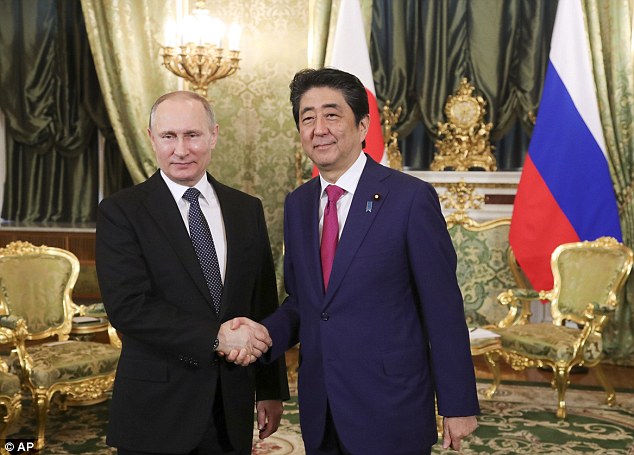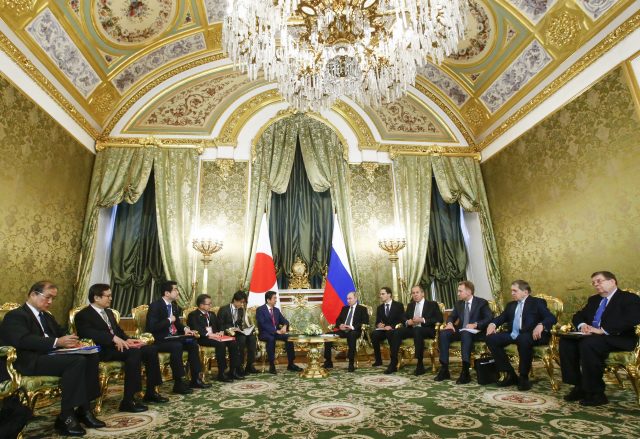World News Actuality Presented By Claire Evren Russian President Vladimir Putin is hosting Japanese Prime Minister Shinzo Abe
Putin warns the situation in the Korean peninsula has
‘seriously deteriorated’ and calls for all nations involved in
the stand-off to ‘refrain from military rhetoric’
- Vladimir Putin has held his third talk with Japanese Prime Minister Shinzo Abe
- The pair discussed the ongoing situation with North Korea and its nuclear programme
- Putin has warned that they believe the crisis is deepening, and called for ‘peaceful dialogue’ instead of military rhetoric
- It comes as Russia and Japan get closer to signing an historic peace treaty
- World News Actuality Article By Claire Evren Russian President Vladimir Putin is hosting Japanese Prime Minister Shinzo Abe
Russian President Vladimir Putin and Japanese Prime Minister Shinzo Abe are calling on North Korea and other countries to avoid behaviour or rhetoric that could increase tensions around Pyongyang’s nuclear programme.
Putin and Abe said they had agreed to cooperate closely to try to help defuse tensions around the secretive Asian state and that both wanted to see a resumption of six-party international talks with North Korea.
“In my opinion, and in the opinion of the prime minister, the situation on the Korean peninsula has unfortunately got a lot worse,” said Putin.
“We call on all governments involved in regional matters to refrain from using belligerent rhetoric and to strive for peaceful constructive dialogue.”
North Korea’s growing nuclear and missile threat is a major security challenge confronting US President Donald Trump, who has vowed to prevent North Korea from being able to hit the United States with a nuclear missile, a capability experts say Pyongyang could have some time after 2020.
Abe told the same news conference that he wanted Pyongyang to refrain from taking any actions that could be perceived as provocative by other countries.
Russian president Vladimir Putin is hosting Japanese prime minister Shinzo Abe in a bid to end a dispute over four islands which has kept the two countries from signing a peace treaty which formally ended the Second World War.
It is the leaders’ third meeting in the past seven months after Mr Putin made a state visit to Japan in December and Mr Abe met the Russian premier in Russia’s Far East in September.
Japan and Russia both claim four islands north of Japan’s island of Hokkaido which came under Russian control at the end of the war.
- World News Actuality By Claire Evren Russian President Vladimir Putin, center right, and Japanese Prime Minister Shinzo Abe, center left, talk to each other during their meeting in the Kremlin
The recent meetings are widely regarded as a sign that both Moscow and Tokyo are eager to settle the dispute over the Kuril islands and sign a peace treaty which the former Soviet Union and Japan never managed to negotiate.
The countries are also discussing the joint development of fisheries, tourism and other businesses and initiatives which might help bridge the gap.
Speaking at the start of the meeting at the Kremlin, Mr Abe told Mr Putin in televised remarks that he would like to discuss various issues including the peace treaty and thanked Russia for taking a “step forward in the Japanese-Russian relations”.
At recent talks, Japan, the United States, South Korea and Australia agreed that China and Russia are crucial in pressuring North Korea to end its nuclear and missile programmes.
Putin and Abe have come one step closer to signing a peace treaty today, after discussing joint economic projects on the four disputed islands.
Japan and Russia both claim four islands north of Japan’s island of Hokkaido which came under Russian control at the end of the Second World War.
Thursday’s meeting in Moscow is the third between the leaders in the past seven months; Mr Putin made a state visit to Japan in December, while Mr Abe met Putin in Russia’s Far East in September.
Mr Putin and Mr Abe said after the talks at the Kremlin that a group of Japanese officials and businessmen would travel to the Kurils next month to examine opportunities for Japanese investment.
Mr Abe added that he read out to Mr Putin during his visit in December letters from Japanese people who grew up in the Kurils and wanted to visit the graves of their loved ones.
Mr Putin said he would send a plane to Japan to take those who want to visit the graves, a move he hopes ‘will contribute to creating an atmosphere of trust and understanding between our nations’.
- World News Actuality Presented By Claire Evren




